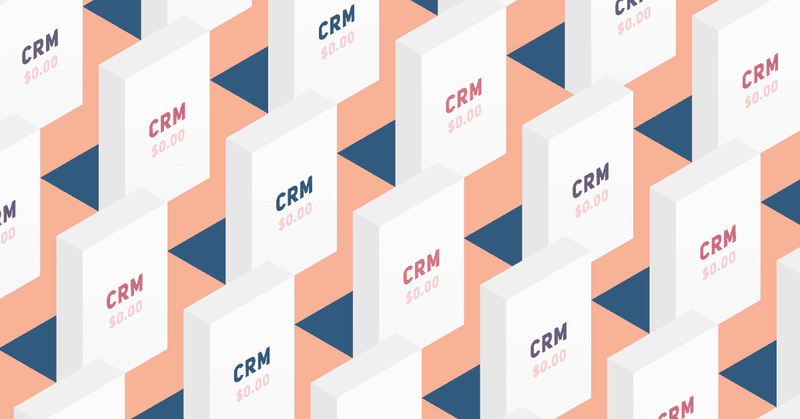If you have a desktop full of spreadsheets that are becoming too hard to manage, but you're not sure if you need a full CRM, ask yourself these questions:
- Why do you need a CRM?
- What can a CRM do to make your life easier?
- How can a CRM help you reach your future goals?
Once you know the answers, a great place to start is with a free trial. Most CRMs offer up to 14 days free and to sweeten the deal some CRM systems offer a free forever plan too.
The regularly cited best free CRMs include:
- Capsule
- Hubspot
- Zoho
- Agile CRM
The best things in life are free
The best free CRMs are perfect for a startup or small business owner with a small number of contacts and just a couple of CRM users. Most of the free plans limit the number of contacts and users, but they’re a great place to start as they focus on the basics first. Much of the appeal in a CRM is the ability to customize the program to your company's personal preferences and specifications. Some of the best features of a free CRM are:
- The ability to organize your contacts the way you want them.
- To set up a simple sales pipeline with your own milestones.
- Reporting on basics such as the pipeline forecast, conversion rate, plus won and lost opportunities.
Integrating software with your free CRM
It should be easy to connect your most important business software to your free CRM using a third party such as Zapier, PieSync or the CRM’s custom-built integration. Depending on your own capabilities or the skills of your IT department, getting your CRM to work seamlessly with other productivity or financial software shouldn’t be a chore.
It’s crucial to integrate because the more you connect, the more data you can automatically collect, and the deeper you’ll understand your customer. If you can stay in touch with customers regularly, the relationship solidifies, and your brand strengthens as clients continuously see the name of your business in their email inboxes, push notifications or text messages.
At a basic level, email is one of the most essential integrations. It’s often looked at as the lifeblood of many organizations that rely on clear and timely communications among departments, managers, and customers. Whether you use Gmail, Mailchimp, Office 365 or another platform, make sure it’s easy to connect to your free CRM and record your customer conversations.
If you’re new to business software tools, it’s worth looking at the best free plans available for them too. If you work it right, you may be able to connect all your most essential software without spending a dime. Naturally, all free programs usually provide an option to expand your range of services as your business grows. Most software purveyors will offer two or three upgrade options, but be mindful that these could have hefty expenses.
Examples of the best free forever business software include:
- Google Workspace: If you’re looking for an integration that boasts a ton of functionality, look no further than the Google Workspace offering from Google. You can share spreadsheets, calendars, and slides with colleagues or customers. And with Google Drive, 30GB of free storage comes with the basic plan, so forgetting to back up important files or not being able to retrieve them on the road will be a thing of the past.
- Mailchimp: Email is a vital part of any sales and marketing campaign, but hammering out individual emails to prospects or clients can be time-consuming. With Mailchimp, you can reach a vast number of contacts with a few simple steps. Creating an automated drip marketing campaign will ensure your name is in front of prospective customers at regular intervals.
- Zipbooks: Integrating your company's accounting platform and CRM will save time and effort in regards to managing your finances. With the free version of Zipbooks, you can mail an unlimited number of invoices to existing customers and link one bank account. It's important to note that if you use PayPal or Square, your business can also accept electronic payments from the platform.
- Slack: When you’re collaborating with co-workers, keeping everybody on the same page can often be a challenge, especially with the distance between two parties. If your CRM is integrated with Slack, you can share leads with your external sales team in real time.
- Trello: As projects move down the road, engaging and informing stakeholders will no longer be an issue when all contributors are working in Trello. At a glance, the app’s dashboard offers a consolidated look at project status and lets individual team members know what expectations are and the next steps required to fulfill them.
What to expect from a free CRM
If you choose a free CRM that locks most of the features but provides unlimited data or users, you’ll only experience a small portion of the software. The best free CRM for your company will be the one that allows access to all the features for a small number of users. Having access will provide a comprehensive view of the whole CRM, enabling you to make an informed decision about whether it’s a good fit for your business.
Here’s are a few features you should be able to access with a free CRM:
- Easily store all the data you need for each customer.
- Organize your contacts in a familiar way.
- Store email conversations.
- Customize and manage your sales pipeline.
- Integrate with important business software.
- Provide an overview of your sales performance.
- Most importantly, your free CRM software provider should support you.
Every CRM will give you access to a comprehensive support portal with all the relevant help articles and videos. Very few free CRMs offer unlimited support from the team - this is usually saved for those on a paid plan. It’s worth seeking out a CRM that offers this as when you’re new to CRM you’ll likely have lots of questions.
Here are some tips on how to get the most out of a free CRM trial.
Be clear about what you need
Before you start a free trial, be clear about what your business needs. All CRM systems have a abundance of features, but they’ll only add value to your business if they satisfy your core business needs. In most cases, you will have a consultation with a customer service rep or salesperson who will gather basic information about your business and gauge how well their product meets your expectations. Your needs could vary from a very basic solution or the ability to integrate with other modules that help manage your business from end to end.
Limit the choice
Be realistic with the number of free trials you can manage at one time. You may see five to ten different CRMs as a potential fit, but can you test five thoroughly in a short amount of time? All free CRMs have key, bulleted benefits and features on their websites. By quickly combing through how the software works and how it can improve your workflows, you may be able to narrow a choice down to one or two.
Block out time
It's recommended to block out a few days or hours per week to assess the new CRM thoroughly. You’ll need to import your data and test the functionality, which can take some time. Remember, as soon as you sign up, the setup emails will begin to guide you through the most critical steps. You’ll get the most value if you follow the email sequence.
Import real data
Some free CRMs are populated with sample data allowing you to see how the system works before you import your own. You’ll only get a true feel for the CRM if you import real data and assess how the features work with the customer information you have available. Take a test drive before you pull the trigger, as it’s often difficult to gauge the effectiveness of a program unless you can get a hands-on feel for its capabilities.
Customize what you can
Most CRMs will have default settings for each contact, opportunity, and report. When you implement your CRM, you’ll do a lot of customization, allowing it to reflect your business processes. Taking the time to test how easily this can be done during the trial will help set realistic expectations. The beauty of software is the ability to fine tune features to your liking. Everyone has an individual style and there’s no right or wrong way to help you become more productive.
Connect your software
A CRM delivers the most significant value when it becomes the hub of your business and pulls in data from other sources. Each CRM will have a different way of displaying the data you pull in from an integration.
Invite the team
Considering your CRM is likely to be used by multiple people within your business, it's best to invite them to the trial. You may find a specific feature that gives you everything you need, whereas another colleague may need more. It’s useful to invite the primary users of the CRM to discover how well it works for them too.
Test out support
When you implement your free CRM, you're likely to need a bit of help every now and again. During your trial, you should utilize the support portals, knowledge base, watch the videos, and email the support team. Assess the support across all channels as it’s a good indication of the onboarding experience.
When creating a short list for the best free CRMs, Capsule should be at the very top. In addition to our excellent support team, our free plan includes:
- Access for 2 users
- Up to 250 contacts
- 50MB storage per user
- Unlimited customization to contact data
- A fully customizable sales pipeline
- Sales dashboard and activity reports
- Unlimited bespoke workflows for opportunities or projects
- Data segmentation tools - lists, filters and tags
- Basic project management tools with Projects, tasks and calendar
- Ability to sync your Capsule calendar with your own
- Integration with Gmail and Mailchimp
- Unlimited Zapier integrations
You can customize Capsule as much as you wish on the free plan, there are no restrictions, and you can report on basic sales activity too. It’s perfect for start-ups and small business owners starting with a CRM for the very first time. Sign up now.




